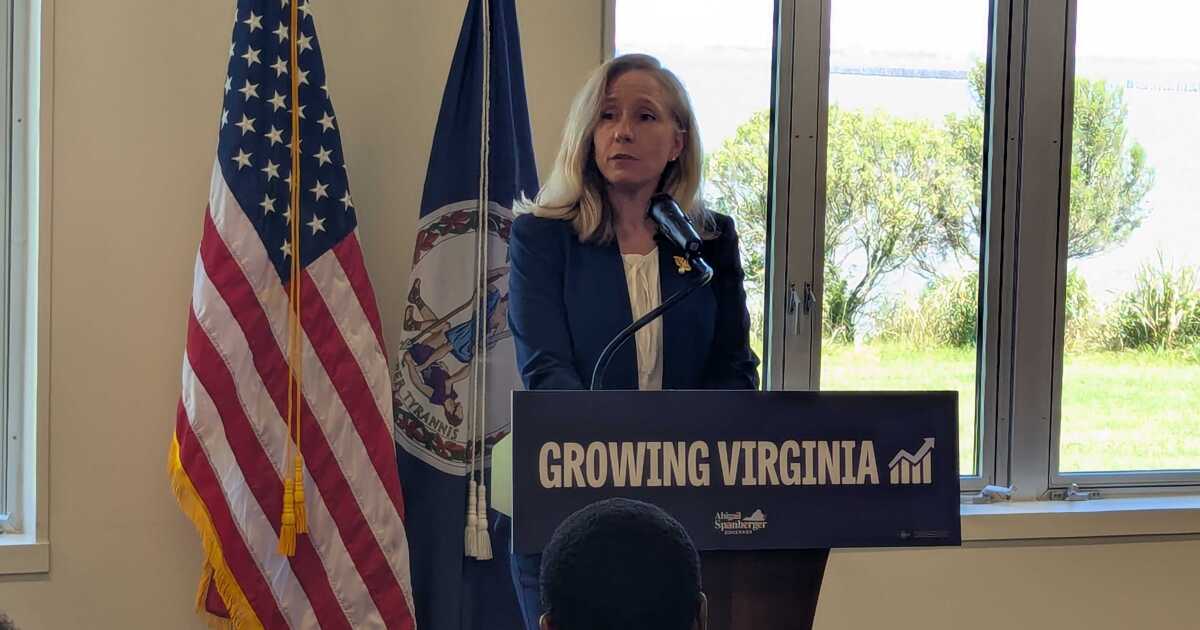With less than 100 days until the November election, economic concerns are dominating the Virginia gubernatorial race between Democratic candidate Abigail Spanberger and Republican Lt. Gov. Winsome Earle-Sears. Spanberger has unveiled a comprehensive three-part strategy aimed at boosting economic resilience through business development, workforce training, and expanded trade opportunities. Her proposals include expanding apprenticeship programs, dual-enrollment education initiatives for high school students, infrastructure investment, and enhanced broadband access in rural areas. She also emphasized the importance of maintaining international trade relationships while opposing potential trade conflicts that could harm Virginia exporters.
To support these initiatives, Spanberger has introduced an affordability plan targeting reductions in healthcare, housing, and energy costs. Her announcement comes amid Virginia’s drop from first to fourth place in CNBC’s annual ranking of top states for business, partly due to federal budget cuts and job losses. According to projections from the University of Virginia’s Weldon Cooper Center for Public Service, the state may lose over 30,000 jobs in 2025, with GDP growth slowing to 0.4% compared to 2.4% in 2023. Recovery is anticipated by late 2026.
Spanberger pledged to assist displaced federal workers in finding new employment and to collaborate with the state attorney general to provide legal support for affected individuals and businesses. She criticized current leadership for failing to address economic vulnerabilities, advocating instead for a proactive approach to economic revitalization.
Earle-Sears, meanwhile, has also centered her campaign on affordability, emphasizing tax reductions and regulatory reforms. Her platform includes continuing Governor Glenn Youngkin’s efforts to eliminate unnecessary business regulations, with the administration having already surpassed its initial goal of cutting 25% of state regulations ahead of schedule. Earle-Sears has also committed to reducing personal property taxes on vehicles, a stance shared by Spanberger. Additionally, she advocates for preserving Virginia’s right-to-work laws, which she claims protect employees from mandatory union membership and dues while promoting job creation.
Both candidates recognize the importance of maintaining Virginia’s competitive edge in attracting and sustaining business growth, though their approaches differ significantly in terms of policy implementation and government intervention.
— News Original —
Economic issues at the forefront for Spanberger, Earle-Sears
Nearly 100 days until the November election, Virginia’s economy is becoming the focus for gubernatorial hopefuls.
Affordability and growth are the key words headlining Democratic candidate Abigail Spanberger’s plans. She detailed her ideas at Tidewater Community College in Suffolk on Tuesday, which centered around growing business investment, the workforce and trade opportunities for Virginia producers.
“Virginia needs a governor who is focused on maintaining our trade relationships and finding new markets for Virginia exports,” Spanberger said. “Not cheering on potential trade wars or hoping it will all just work out.”
Spanberger’s three-pillar plan includes nearly two dozen goals and initiatives. They range from promoting apprenticeship programs and dual-enrollment courses for high school students; increasing investment in infrastructure and rural broadband internet; to continuing port investment, bolstering departmental cooperation to better assist small businesses and increasing agricultural exports.
To accomplish any of that, Spanberger said the next governor will have to make living in the state more affordable. The congresswoman announced her affordability plan earlier in the summer, which includes ideas for lowering the costs of health care, housing and energy.
“We are living in a moment of uncertainty,” Spanberger said Tuesday. “Virginians are facing unprecedented attacks on their jobs, on our businesses and on their financial futures.”
The announcement comes as Virginia fell from first to fourth this month on CNBC’s ranking of top states for business. The impact of federal cuts and layoffs was a factor.
The commonwealth is expected to lose more than 30,000 jobs this year and see an increased average unemployment rate, according to a study by the University of Virginia’s Weldon Cooper Center for Public Service. Researchers project the state could begin to rebound in late 2026. The state recorded a 0.4% growth in GDP, down from 1.9% in 2024 and 2.4% in 2023.
Spanberger said her plan will prioritize helping laid-off federal workers find relevant jobs, and that she’ll work with the state attorney general to fight for legal aid for those affected. She said she’ll do the same to fight “unlawful actions by the federal government” and protect Virginia companies from the impact of increased tariffs.
“We need a governor who will not dismiss these threats to our economy, but one who actually has a plan to rebuild a more resilient economy,” Spanberger said.
Her opponent, Lt. Gov. Winsome Earle-Sears, is also focusing on affordability in the election. Her team did not respond to an emailed request for comment, but Earle-Sears’ campaign website lists reducing the cost of living in the commonwealth at the top of her goals.
Her site states she’ll prioritize tax cuts and continue Gov. Glenn Youngkin’s work to streamline or scrap business regulations.
“She will scour the government books to cut wasteful government spending and job-killing regulations,” her website reads, “because taxpayers know how to spend their money and run their businesses better than government.”
Youngkin’s office touted this month that the administration met its goal of cutting 25% of state regulations ahead of schedule, and is now aiming for 35%.
Earle-Sears has pledged to cut personal property tax on vehicles. It’s a point of common ground with Spanberger, who has pledged to do the same if she wins. Earle-Sears’ site also prioritizes protecting Virginia’s right-to-work laws, which prohibit workplaces from requiring employees to join a union to be hired.
Earle-Sears’ website states the policy is essential to economic success, and that it protects workers from “heavy-handed union bosses, forced dues, and fewer job opportunities.”
“As governor, Winsome will protect Virginia’s business- and worker-friendly environment that has contributed to our increased job growth, higher wages and lower unemployment rates.”
